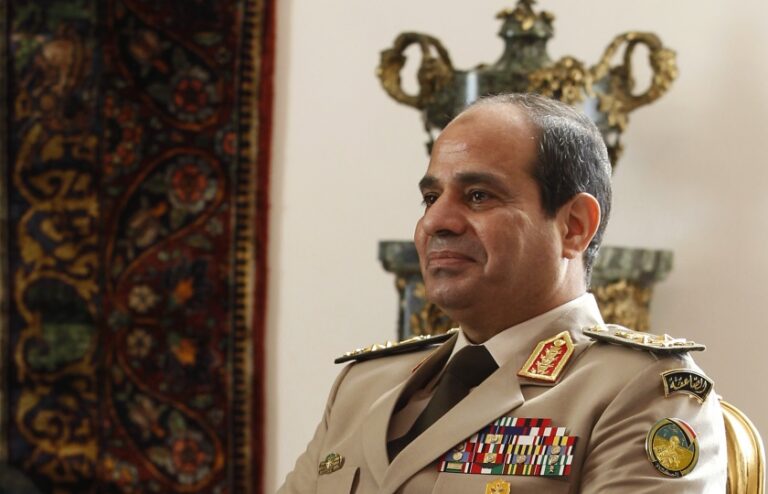A few days were sufficient for a change in the official Egyptian position regarding what is happening in Jerusalem and the Gaza Strip. This change became noticeable and raised questions on the street and among Palestinian factions.
The Egyptian position has changed from a timid statement after two days of violence in the Sheikh Jarrah neighbourhood to an unusual diplomatic tone in favour of the resistance and its various factions. The authorities also allowed a fiery Friday sermon about Al-Aqsa from Al-Azhar Mosque. It also issued instructions for pro-regime media to support the Palestinians. The matter did not stop at that. Instead, Egypt entered the battle of mediation forcefully through diplomatic shuttle moves to calm down and open the Rafah crossing and equip hospitals to receive the wounded in Gaza. This indicates a change in the Abdel Fattah Al-Sisi regime’s position regarding the Israeli bombing of Gaza in 2014, during the rule of the same regime. This change indicates that Cairo does not want any other party to lead the scene, especially Turkey. Therefore, these positions aim to confirm Egypt’s leadership of the Palestinian issue and confirm that the Egyptian role cannot be replaced.
Foreign Minister Sameh Shoukry’s statements held Israel responsible for the escalation, calling for the people of the region to be spared further escalation and resort to military means. Shoukry made a series of contacts with his counterparts in Arab and Western countries to mobilise international action against the Israeli attacks before a security delegation heads to Ramallah and Tel Aviv and contacts the resistance factions to reach a ceasefire agreement or a humanitarian truce.
In the emergency meeting of the Arab League, Shoukry used a completely different tone, especially when he said that “the continuous attempts to change the identity of Jerusalem and deny its Arab people their rights have not gone unnoticed.” “It was not surprising what we saw from the people of Jerusalem who are fighting a battle to defend identity and existence that resonates throughout the free world, and every Arab looks at it with pride.”
Despite these efforts, Egypt did not get a positive response from Israel, which rejected its proposals for a ceasefire or truce. Perhaps it was the Israeli response which changed the direction of Egypt to support the factions. However, observers said that “the rapid transformation of the Egyptian position after the Israeli responses were a precedent, due to the Egyptian dissatisfaction with many of the recent Israeli moves that took place in agreement with Arab parties, and Egypt’s exclusion from its own consultations.”
Egypt is disturbed by the pace of normalisation, led by the UAE, and in which Abu Dhabi provided pressure and incentives to Arab countries to normalise their relations with the occupation. Cairo believes that this reduces Cairo’s regional weight in terms of Arab-Israeli relations, in which Cairo will not enjoy a special status. If certain agreements are signed, the Israeli presence in Sudan and the Red Sea raises security concerns for Cairo.
Therefore, according to observers, Cairo considers that the current escalation is an opportunity to slow the pace of normalisation and to reaffirm the fundamentals of the Palestinian issue that are agreed upon in the Arab world, which make the pressures of normalisation “less effective,” especially with the return of negative public feelings towards the occupation. Cairo then announced the opening of the Rafah Crossing to receive the injured from the Gaza Strip and prepare three hospitals in North Sinai to receive them. According to local media reports, it later sent medical delegations to these hospitals and the hospitals in the Strip.
Instructions were also issued to the Egyptian media, most of which are controlled by the intelligence apparatus, to shed light on Israeli practices and violence in Jerusalem and Gaza and not offend the resistance factions or display any negative opinions and positions. The recommendations included focusing on the term “Palestinian resistance” without naming the factions. Parliamentarians, media professionals, and artists responded to these instructions, declaring their support for the Palestinian cause and Jerusalem, and calling for an end to the bombing of Gaza.
The live transmission of the Friday sermon today from Al-Azhar Mosque is a remarkable step. It was conducted by the Imam Ahmed Omar Hashim, who is known for his desperate defence of Palestine. He spoke with a new tone in support for the Palestinian resistance. In his sermon, Hashem called for the formation of an “Islamic deterrent force” and called on Arab and Muslim rulers to give up their silence to save Palestine, describing the Israelis as “the Zionists who are scavengers of the earth.” The Egyptian media usually ignores the transmission of the Friday sermon from the Al-Azhar Mosque and restricts its transmission to the mosques of the Minister of Endowments.
However, the channels affiliated with General Intelligence transmitted the sermon from the Al-Azhar Mosque. Observers considered that a shift in the government’s stance towards the resistance and the issue of Jerusalem. However, despite all of this, popular interaction on the ground has not yet been revealed.
It is noteworthy that the Egyptians, their universities, their unions, and sometimes their schools in Cairo and major cities, are at the forefront of the demonstrators whenever an assault occurs by the Israeli occupation on the Palestinians, especially if the arena is Jerusalem. However, in recent years there has been a significant decline in Egyptian demonstrations in support of the Palestinians in the face of the brutality of the Israeli occupation.
The last demonstration took place timidly in 2017 on the stairs of the Syndicate of Journalists, against the US transfer of its embassy to Jerusalem, and ended with the arrest of some activists, journalists, and university students who participated in similar demonstrations.





Recent Comments